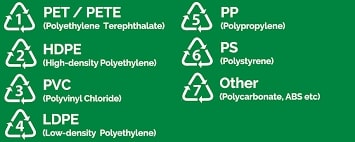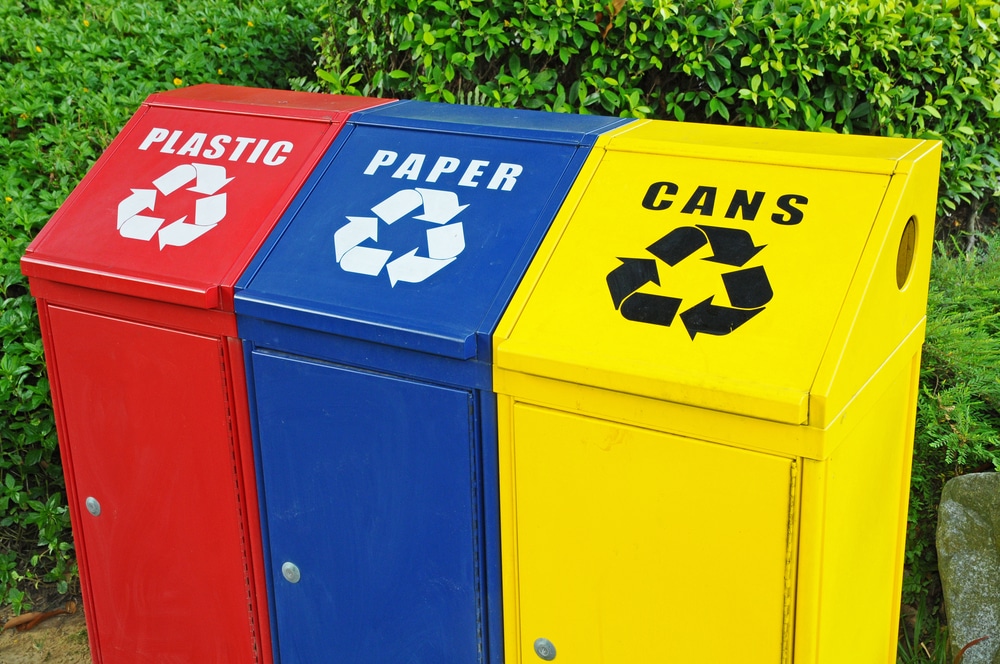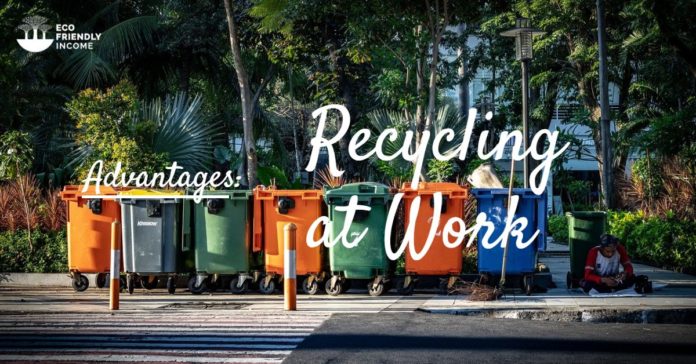The phrase ‘reduce, reuse, recycle’ is a very common expression nowadays, from environmentalists to anti-pollution activists, and even primary school kids whose teachers take the initiative. Teaching them about the dangers and severity of waste being tossed up in piles at landfills. Recycling plays a major role in reducing the colossal amount of trash that gets discarded on a daily basis, and it is a process conducted in the most creative ways sometimes.
What are the Benefits of Recycling?
1. Prevents trash from being incinerated

There are countless benefits when it comes to recycling. Not only for preserving the environment, but boosting the economy and creating jobs.
When you recycle, you prevent your trash from being sent to incinerators where a certain city or community’s waste gets burned.

The process of incineration prevents us from benefiting from raw materials that get tossed away. In addition to that, the gases emitted from this waste burning are very toxic and harmful.
It requires a very large budget to hire specialists to clean the air. Moreover, incineration of waste is conducted so regularly that it would cost an arm and a leg to clean the air from its carbon emissions. That in itself contributes to climate change and air pollution.
2. Materials that were already extracted are re-used. It saves having to mine, quarry or log again
When you recycle, it means that certain materials like glass or aluminum or plastic are reprocessed into new products and as a result the quantity of rubbish is reduced.
However, in case these used materials are not converted or reproduced, the companies will have to extract raw materials from the earth. Providing the necessary components in creating and making products for people, which means they would do that through mining, quarrying and logging.
This need to produce using materials extracted from the earth requires a lot of energy and costs considerably huge amounts of money. Whereas using recycled materials helps companies and businesses not only in saving energy but also in increasing their capital in the long run. Especially when comparing costs associated with the process of recycling versus that of providing materials that need to be extracted first, then refined then transported to be processed in order for it to become industry ready.
3. Keeps over-exploitation at bay
The various processes through which we get raw materials, such as mining, quarrying and logging, are among the top reasons, and a direct cause for that matter, of water, air and earth pollution.
Recycling doesn’t only help in saving energy but also in reducing greenhouse gas emissions, thus helping to protect the environment.
Alongside reducing and reusing, recycling ranks pretty high in factors that play a key role in combating and hopefully one day abolishing pollution. It contributes in conserving natural resources that are being depleted on a daily basis by money driven capitalist companies and businesses that only see these resources as a way or means to achieve their economic goals.
When we speak of recycling paper and wood, it seems a bit odd at first, and we obviously think that such a small action surely can’t “save the environment”, but every person counts, every action does as well. Recycling wood and paper helps protect trees and forests from deforestation. Of course planting new trees is important too, but we cannot replace rain forests and woodlands once they are gone. That and the fact that trees take such a long time to grow and get to the point where they contribute to the flourishing of the ecosystem, becoming an active part of it.
The operation through which plastic is made generally involves fossil fuel extracted out of oil and gas, both of which are non renewable resources, which means that recycling plastic immensely helps in reducing the need to create new plastic, thus preserving oil and gas resources from being depleted.
4. Keeps our beaches from being over exploited

Who likes to see beaches full of plastic waste? Recycling reduces that problem at the source.
Also, As we know, glass is made out of sand, and nowadays there are some types of sand that are being used too much that, as bizarre as it sounds, their supplies are starting to get dangerously low. Thus, recycling glass helps in the department of reducing the need to extract and process materials like sand to make glass products.
5. Recycling benefits the natural world
Bottom line is recycling helps keep waste out of the environment, as there is a lot of oil spillage in oceans, as well as plastic, which inevitably harms and disrupts the natural world and wild animals and fish.
There are so many endangered species nowadays, the list keeps getting longer, and pollution is the main cause of the damage being done to various animals and their habitats.
This culture of consumerism has people buying and acquiring products that are sometimes useless and will most likely end up going to waste, this is also why the debate of recycling is crucial to raise awareness and thus propel people to buy less things, try to use the things they own already as much as possible, but most importantly to recycle.
The process of recycling may sound complex at first, and chances are most people have heard about it at some point of their lives but were too confused to actually entertain the thought or dig deeper to understand the core of this process or what it really is.
How do I get started?
1. Learn the types of plastics
There is a certain level of awareness you need to have before you start successfully recycling your products, for example, when it comes to plastic there are many types that serve different purposes, some types are accepted into the recycling bins while others aren’t compatible with those.
These types of plastic use different symbols that you can easily locate in each product, they’re used by the manufacturer to help you identify the type of plastic resin used in that container and whether or not they can be recycled. Check out the list below:
1. PET, Polyethylene Terephthalate, clear or slightly tinted (plastic bottles, food jars, microwaveable food trays)
2. HDPE, high density polyethylene, translucent or colored (milk jugs, grocery bags, shipping containers)
3. PVC, Polyvinyl Chloride, shiny surface, resistant to grease and oil chemicals (packaging, cooking oil bottles, fresh meat wraps)
4. LDPE, Low Density Polyethylene, tough, flexible and relatively transparent (shrink wrap, stretch film, bags for frozen or fresh produce, lids, toys, squeezable bottles)
5. PP, Polypropylene, clear with low moisture vapor transmission (containers for yogurt, margarine, deli meats, medicine bottles, bottle caps, syrups)
6. PS, Polystyrene, significantly stiff and clear to some extent (styrofoam containers)
7. Other, all other plastics (reusable water bottles, oven-baking bags and custom packaging)

2. Inquire your local recycling program about plastics and glass
These symbols can help you determine whether the plastic based products you are trying to recycle can be accepted by the recycling program in your community.
One thing to remember is that if not categorized properly, this disrupts the recycling process.
On the other hand, concerning recycling glass, many recycling programs accept glass of different tints or colors and also of different types that can be mixed together but it doesn’t hurt to check whether these types of glass can be mixed together or separated with your community recycling program.
3. Prep the recyclables like bottles and aluminum
Remove all lids and caps, though it doesn’t matter if you leave neck rings on as they will be burned or blown off. Also, don’t forget to rinse the bottles and dump out all food residue from the containers.
Most recycling programs don’t accept all sorts of aluminum, they only consider aluminum cans and foil within their recycling bins, and as stated before, toss away any food or liquid from the cans and foil before putting it in the recycling bin, and make sure to remove any other material that is not aluminum.
4. Tin Cans and metals
Concerning tin cans, most if not all are made out of steel but got their name because they have a tin coating inside that prevents the conserved food from reacting with the steel or for the can to get corrosive.
Household items made of steel such as folding chairs, plumbing tools and fixtures, garbage cans can be recycled along with iron based products.
5. Buy Recycled Products
When going shopping, check if the product you are about to purchase is made from recycled paper. Newspapers, for instance, can be recycled up to 7 times before losing their ability to be recycled once again.
Generally speaking, paper needs to be kept dry, you also need to know that you can’t recycle paper that has been used for birdcages or paintings or art projects.
Become a 21st Century Conservation Hero
“It starts as a conscious effort, then it becomes a habit, then it becomes force of habit”
Pascal Yan
Recycling may seem like a hassle at first, but it gets really simple and easy to go for. As you learn about the various products and in which categories they fall into, recycling will become a mechanical process. As long as you understand and follow the guidelines, you will be successful with your recycling and rejoice at the thought that you are not only helping the community but also the environment as a whole.
A recycling plan for your business
1. Seek out Eco-friendly waste management services
Recycling isn’t just the right choice to make or the right thing to do when it comes to your household or neighborhood but it can easily be implemented in your workplace, whether it be small or large businesses.
Any office or company would greatly benefit from a recycling program within their framework. Most businesses pay for some type of waste management service anyway, so why not invest in a long term solution that will help reduce the cost of these waste management fees and also help protect the environment on the long run.
2. Look into businesses that do trade-ins
Recycling also helps when businesses look to buy new office supplies or tech devices, for example instead of throwing away old computers and devices that are no longer usable, there are some companies that businesses can reach out to to dispose of their old supplies and get a discount when buying new ones.
3. Include it in your branding
The environmental impact is one of the major concerns of public relations practitioners and professionals that work for large corporations, so implementing a recycling program will improve the business’s image and present its employees as environmentally aware people that actually care about their surroundings and the future generations.
There are many large and small corporate businesses that started getting into the anti-pollution and environment protection discourse due to the public’s concern in regards to carbon emission, reducing the environmental footprints, and fostering sustainability and growth in industrial and non-industrial waste reduction.
Finally,
Thank you for doing your part!
When combining these efforts to recycle with efforts to reduce waste and reuse existing products, it ends up being a smart and winning strategy for any business, household or community.
It helps increase awareness about the necessity of conserving materials and energy. This will provide incentive for future generations to take care of their environment. Keep up the good work!

If you enjoyed this article, you might enjoy these too:


It’s great that you pointed out how recycling could help keep waste out of the environment. I attended an environment expo last week and one of the panels there talked about recycling. It is good to hear that there are actually a lot of recycling companies nowadays, and there are even those that offer transformer recycling services.
Thanks for dropping in your thoughts Luke. Regards to EPS